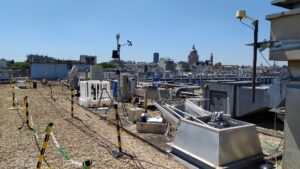Séminaire
Integrating Physics, Data, and Scientific Machine Learning to Better Understand and Model Climate Variability and Extremes
Pedram Hassanzadeh (Rice University)
Séminaire du LMD-ENS.
Description
The global climate adaptation and mitigation efforts require reliable information about the future of climate variability and extremes, particularly at regional scales. Thus, there is a critical need for drastic improvements in our fundamental understanding of the Earth system and modeling capabilities. Integrating observations and physics-based models (theory and hierarchies of computer models) has resulted in significant advances in climate science in the past century.
In this talk, I will first present an example of our recent work using this approach: discovering a new 150-day periodicity in the Southern Annular Mode, which is poorly simulated by many climate models. Then, I will argue that integrating scientific machine learning (ML) with the conventional approach could potentially open new avenues to substantially accelerate climate research, e.g., via developing better and faster weather/climate models, extracting more information from observational data, and even improving our fundamental knowledge.
However, as scientific ML is in its infancy, there are major challenges for climate applications that need to be first addressed. Examples of these challenges include interpretability, stability, extrapolation, and learning in the small-data regime.
I will highlight some of our recent work on the promises, challenges, and future possibilities of applying scientific ML to accelerate climate research. In particular, I will discuss our new method, based on integrating the Fourier analyses of neural networks and climate data, which enables us to explain and connect the learned physics and inner workings of the network. This method is a step toward developing a much-needed general framework to rigorously analyze and understand neural networks for climate applications and making them reliable and effective tools.
Informations supplémentaires
Lieu
ENS – salle Froidevaux – E314 • 24, rue Lhomond 75005 PARIS
From 2pm, same day, same room: seminar by Anna S. von der Heydt – IMAU, Utrecht University
Dynamical systems approaches to climate response and climate tipping






